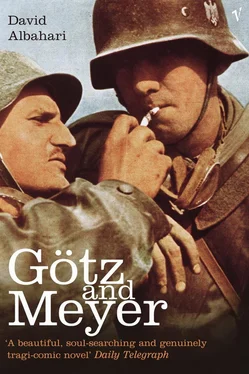No improvisation was permitted. All of it, even art, served the stated goal. If each of them had acted according to his own free will, the whole thing would have crumbled early on. The camp prisoners pretended that they were on their way to Romania, or Poland, and climbed into the truck as if they were marching off to no-man’s land between barbed-wire borders. The Serbian prisoners, mud-splattered, plunged their shovels into the soil and sprinkled it on the overflowing graves as if they were building a bridge spanning the North Sea. And just as the truck was not, in fact, headed for Romania, or Poland for that matter, the bridge they were building took them nowhere. During a flood, there is no dry land. Who could have known? Life is full of tricks, anyway, in war and in peace, it makes no difference. It is always that same convulsive effort to survive just a little longer than planned. Present or absent, God is cruel, there is no genuine mercy in him. When he blinks, he blinks, and there is absolutely nothing to be done about it. Souls cluster around him, voices waft his way like the sound of a thousand little bells, but God merely shrugs them off. That was precisely Götz’s, or was it Meyer’s, shrug of vexation when he saw the broken axle. Something like that must infuriate a person, even if he is as disciplined as Götz and Meyer were. Some things are simply stronger than all that the human spirit creates. And besides, Götz, or was it Meyer, or both, had had it with that wild country, the crude people, the lack of order. It isn’t that Götz, or was it Meyer, was nostalgic, his sense of duty was far greater than any homesickness he might have felt, but it was nice, it had to be said, in the quiet of his room, to eat sausages and drink beer. Had he had supernatural powers at his command, Götz, or Meyer, would have fixed that axle with his own hands and returned it to its original condition. Other trucks in the series had indeed been damaged, especially on the rough roads in Russia and Ukraine, but this was no consolation for Götz, or Meyer, or both of them. A person gets accustomed to things and starts expecting the things to accustom themselves to him with the same ease, and when those things betray him, he is rightly disappointed. Not so much so, at least in the case of Götz and Meyer, that he might kick them, here I am referring to the truck, or say something nasty. And not just because the truck had served them well, but because, unlike the people it transported, it had a soul. Götz, or was it Meyer, knew it did, because countless times, while he had been driving, he had felt the cab envelop him in a maternal sort of way. It did all it could to ease his every movement. If the truck had been able to, Götz, or Meyer, was convinced, it would have flown. It only took two days in Berlin to repair the damage, and, as of June 15, 1942, the truck was on its way to Riga. I do not know whether Götz and Meyer were dispatched along with it. If they were not, it is difficult to comprehend the vastness of their grief. They had cleaned it and polished it so often, wiped down the headlights, washed the windscreen and the interior! A tougher man than Götz and Meyer might find tears welling up in his eyes at the thought. In fact, that first night after they were faced with the horror of the broken axle, Götz, or was it Meyer, did, indeed, feel despair as he lay in bed. There can be no talk, here, of tears, but something clutched in his chest, pressure from within him and from without, he could barely breathe. He stretched his arms and crossed them under his head, but that didn’t help. There was no light in the room, and he could see the sky through the window, sprinkled with stars. Their flickering said something to him, he couldn’t grasp what they were saying, but he felt that the message was somehow related to the discomfort he felt, which was not letting up. Was this the cosmic pain he had read about somewhere? Poor Götz, or was it Meyer. I would have liked to have seen his photograph, perhaps then I could describe the expression on his face. I never saw them, Götz or Meyer, so I can only imagine them. My interest in the two of them came at a time when I was trying to fill in the empty slots in my family tree. I had just turned 50, I knew where I was going with my life, so all that was left was to figure out where I had come from. I went round the archives, visited museums, brought books home from the library. That is how Götz and Meyer came into my life. Almost all the women from my father’s and mother’s families died, as people usually put it, at the Fairgrounds camp, though in fact they died on the streets and byways of Belgrade, in the truck Götz and Meyer drove out to the execution grounds in Jajinci. Those two names are first mentioned in a telegram from SS-Obergrupenführer Heinrich Müller, head of the Berlin Gestapo, sent in mid-March 1942, to the chief of the German police in Belgrade, SS-Standartenführer Emanuel Schäfer. The telegram announces the arrival of the specialists with the purpose-built truck, and that they will present their orders upon arrival. I have to confess that this drew me to Götz and Meyer, the fact that they were not little cogs in a vast mechanism, blissfully unaware of what the mechanism was for, rather they were entirely aware of the nature of their assignment, being simultaneously the heralds of death and death itself. I tried to picture the moment when their superior officer informed them of the purpose of their journey. Götz and Meyer are standing at ease, barking their Yes, Sirs, but maybe they didn’t even need an explanation, maybe they had already gained enough experience on the Eastern Front, this is plausible enough, especially if you consider the requirement for maximum efficiency. In that sense, the staff must be so smoothly rehearsed that they would present no risk or weak link in the chain, so Götz and Meyer could hardly have been novices. I tried to picture how, if they were married men, they had said good-bye to their wives. Götz, or maybe Meyer, would kneel before his wife and rest his cheek on her stomach, while Meyer, or maybe Götz, would plant a kiss on his wife’s head. What did he say to her? How much did his wife know? She must have known something, those things slip out, perhaps one of the men talked in his sleep, or maybe he blurted something out during dinner. But, in times of war, it is best, if you are not a direct participant, to know as little as possible, because this is at least a tiny victory over a reality that is the same for everyone, regardless of political conviction. No matter how strange it may sound, it is sometimes easier to understand women than men. What, for instance, did Götz, and Meyer, talk about as they drove to Belgrade? I doubt that they admired the beauty of the flat or hilly landscape, though Götz, or was it Meyer, would quote a verse from Goethe from time to time. They did not speak of the job either, which had already become routine by then, or the calculation, which showed how many days were left until they could go home. (Fifty-four by their count, in fact around eighty.) They may have talked about their return, but then what else would they have to talk about during all the days that stretched before them in that godforsaken hole? Götz, or was it Meyer, the one who was married, was anxious about his daughter Hilda’s frequent sore throats. She’ll grow out of them, Meyer, or was it Götz, consoled him, the one who was probably not married, but it is true, he added, that one must attend to one’s health from childhood. As a boy, for instance, he had longed to be a pilot, but he had not looked after himself, and if he had done a better job, he would have made a better showing on the tests and examinations, and right now, why, he might have been sitting in the cockpit of a Messerschmitt. Götz, or maybe Meyer, had quite a laugh over that story! He slapped his knee.
Читать дальше












